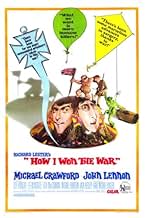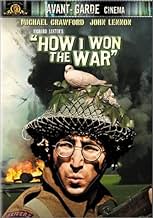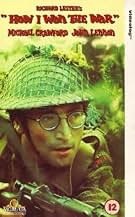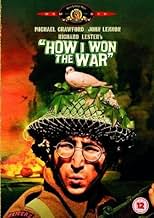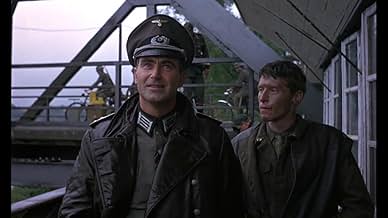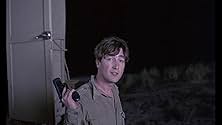AVALIAÇÃO DA IMDb
5,5/10
2,6 mil
SUA AVALIAÇÃO
Um inepto comandante da Segunda Guerra Mundial lidera suas tropas em uma série de desventuras no Norte da África e na Europa.Um inepto comandante da Segunda Guerra Mundial lidera suas tropas em uma série de desventuras no Norte da África e na Europa.Um inepto comandante da Segunda Guerra Mundial lidera suas tropas em uma série de desventuras no Norte da África e na Europa.
- Direção
- Roteiristas
- Artistas
- Direção
- Roteiristas
- Elenco e equipe completos
- Produção, bilheteria e muito mais no IMDbPro
Avaliações em destaque
Wow, it is not everyday that one comes across a right-wing essay on the IMDB as one of the posters did in regards t this film. First of all, I am delighted to have finally seen this. Aside from "The Royal Flash" and "Cuba," I believe I have seen most of Richard Lester's films which are of significance. I think too look at this film from a mere political pov is a mistake. It is a good statement first of all about how utterly ridicilous the war process is. Sure, there are awful people like Hitler and Mullah Omar, out there who threaten the world at large but by and large, the war process rarely leads to any resounding political solutions and long-term peace and understanding. I think even people who generally support their government's wars would agree to this sentiment. Lester does a brilliant job of poiting this out through the course of this film, and he is helped by some great acting- including a surprisingly brilliant John Lenon to achieve this great satire. Lester, who was actually born in Philadelphia, has a great sense of man's moral faults and he reflects that in this film, as well as in "Petulia"- which is considered to be his best film. I think Lester's genius can even be seen in his two most blatant commerical ventures, "Suprman II" and "Butch and Sundance: The Early Years" as well as the Beatles movies. He deserves more respect, and I think one day he just might get it.
'How I Won the War' has to be one of the most original, bizarre and imaginative war films ever made. I first saw it late one night as an impressionable kid and immediately was drawn by its unusual style and narrative. To have the film tinted in several different colours to show the stages of the war was both daring and cool. One gets the feeling of having witnessed something larger, more intimate and important than just a mere war movie.
There are no real heros in this film, certainly Michael Crawford and his troop are pretty cowardly and inept, whereas the Germans are depicted, in the raid on the fuel dump scene, as being content with religious service and a bit of soccer.
It is true that history is written by the victors and Michael Crawford's character, Goodbody, is one of only two survivers from his regiment. He proudly states at the very end of the film that he "won the war". Maybe he did, but his actions and his balmy enthusiasm show us just how idiotic war can be.
My favourite scene was the one with Goodbody and the German officer who befriends Goodbody for much of the film. Together, they talk about how cruel both the British and Germans are, and how the German officer has killed many Jews. Goodbody then talks about how he got his commission and why he is fighting. It ends with the German officer telling Goodbody that he (Goodbody) is a fascist. "Am I?", replies Goodbody, "but I don't particularly dislike Jews."
When the very affable German officer, who is attempting to surrender, is blindly run over by an advancing British tank, we know that in this war the good, the bad and the ugly become mixed up and inseperable.
I currently own a very worn out video of the film and am hoping it will be released soon on DVD here in Australia.
There are no real heros in this film, certainly Michael Crawford and his troop are pretty cowardly and inept, whereas the Germans are depicted, in the raid on the fuel dump scene, as being content with religious service and a bit of soccer.
It is true that history is written by the victors and Michael Crawford's character, Goodbody, is one of only two survivers from his regiment. He proudly states at the very end of the film that he "won the war". Maybe he did, but his actions and his balmy enthusiasm show us just how idiotic war can be.
My favourite scene was the one with Goodbody and the German officer who befriends Goodbody for much of the film. Together, they talk about how cruel both the British and Germans are, and how the German officer has killed many Jews. Goodbody then talks about how he got his commission and why he is fighting. It ends with the German officer telling Goodbody that he (Goodbody) is a fascist. "Am I?", replies Goodbody, "but I don't particularly dislike Jews."
When the very affable German officer, who is attempting to surrender, is blindly run over by an advancing British tank, we know that in this war the good, the bad and the ugly become mixed up and inseperable.
I currently own a very worn out video of the film and am hoping it will be released soon on DVD here in Australia.
Take a movie like this. You may have heard somewhere that it was pretty bad. But, being an inquisitive sort, you visit IMDb first anyway. Here, you are greeted with plenty of reviews that tell you that it's not so bad - some even call it a masterpiece and a hidden gem.
Then, you watch it and the cold hard reality hits you - it's just not that good of a movie. The first half an hour seemed to take about four. Yes, there are "innovative" aspects such as tinting people and scenes differently, but ultimately this is cheap and adds little.
There are far better anti-war films of the same period. "How I Won the War" with a big star (Lennon) was made in 1967. Steve McQueen's "The Sand Pebbles" of 1966 is, although a much longer movie, an infinitely better anti-war film that managed to convey all of the same philosophical points as HIWtW (and more) and do it with subtlety, class, and genuine humanity.
The saving grace of HIWtW should have been comedy - absurdist or otherwise. The ingredients were there - war and military life are just asking for the application of ironic and observationalist British wit. Alas, while the characters spend most of the time speaking in that fast British way as if they were saying something as clever as, say, Monty Python or Fawlty Towers, what they actually say is substantially less interesting. Pity.
This film is not particularly worth watching.
Then, you watch it and the cold hard reality hits you - it's just not that good of a movie. The first half an hour seemed to take about four. Yes, there are "innovative" aspects such as tinting people and scenes differently, but ultimately this is cheap and adds little.
There are far better anti-war films of the same period. "How I Won the War" with a big star (Lennon) was made in 1967. Steve McQueen's "The Sand Pebbles" of 1966 is, although a much longer movie, an infinitely better anti-war film that managed to convey all of the same philosophical points as HIWtW (and more) and do it with subtlety, class, and genuine humanity.
The saving grace of HIWtW should have been comedy - absurdist or otherwise. The ingredients were there - war and military life are just asking for the application of ironic and observationalist British wit. Alas, while the characters spend most of the time speaking in that fast British way as if they were saying something as clever as, say, Monty Python or Fawlty Towers, what they actually say is substantially less interesting. Pity.
This film is not particularly worth watching.
I just saw this film for the first time last Friday night at an American Cinematheque screening in L.A. I had pretty low expectations for it but was curious to see John Lennon in an acting role. You could see this film as a pre-cursor to M*A*S*H, but I think that's giving it too much credit.
In short, the film succeeded in meeting my low expectations. I've seen my share of British cinema and particularly a lot of Monty Python, which this film vaguely recalls, and this was a challenging film for me to watch in terms of understanding the humor, the language, and the slang being used by the characters. The bits of slapstick are good, but there aren't enough of them to save the film. Michael Crawford is really the star of the film, and I discovered that a little of him goes a long way. Ninety minutes of him is too much. As for Lennon, he's mostly a small supporting character, although he's given virtually equal billing with Crawford. If you saw Help! or A Hard Day's Night, you know a little about John's personality, and it shines through in the same way here.
I'd recommend watching this at home on video, where you can stop it and return to it if it gets tiresome, which it probably will. I understand that it's due for a DVD release sometime soon.
In short, the film succeeded in meeting my low expectations. I've seen my share of British cinema and particularly a lot of Monty Python, which this film vaguely recalls, and this was a challenging film for me to watch in terms of understanding the humor, the language, and the slang being used by the characters. The bits of slapstick are good, but there aren't enough of them to save the film. Michael Crawford is really the star of the film, and I discovered that a little of him goes a long way. Ninety minutes of him is too much. As for Lennon, he's mostly a small supporting character, although he's given virtually equal billing with Crawford. If you saw Help! or A Hard Day's Night, you know a little about John's personality, and it shines through in the same way here.
I'd recommend watching this at home on video, where you can stop it and return to it if it gets tiresome, which it probably will. I understand that it's due for a DVD release sometime soon.
Incompetent Lieutenant Goodbody leads a group of recruits who grow to hate their commander. They train in a mock up of WWI trench warfare. They land on North Africa to battle the Nazis. The biggest draw is John Lennon playing a supporting character. It's a surreal anti-war dark comedy. Director Richard Lester uses various methods including breaking the 4th wall and doing a faux documentary. I am often reluctant to rate foreign comedies when half of it is lost in translation. In this one, the thick British accents and unknowable foreignness make much of it incomprehensible. Mostly, it's not that funny. The bigger war footage is recycled while there are some smaller action. There is an anti-war message but it's a muddle of outlandish surrealism. On its most basic element, it's hard to follow and not that funny.
Você sabia?
- CuriosidadesThis was the first time John Lennon wore his soon-to-be-trademark granny glasses in public.
- Erros de gravaçãoWhen Goodbody lands on the beach, he eventually comes across rows of helmets with black capercaillie feathers, representing a military graveyard, with a French flag at half-mast. No French troops wore helmets like this, but the Italian Bersaglieiri did.
- ConexõesFeatured in Film Review: Film Review (1967)
- Trilhas sonorasAuf Wiedersehn, Sweetheart
(uncredited)
Written by Eberhard Storch, English language lyrics written by John Turner and Geoffrey Parsons
Performed by Vera Lynn With Soldiers and Airmen of Her Majesty's Forces
Principais escolhas
Faça login para avaliar e ver a lista de recomendações personalizadas
- How long is How I Won the War?Fornecido pela Alexa
Detalhes
- Tempo de duração
- 1 h 49 min(109 min)
- Cor
- Proporção
- 1.66 : 1
Contribua para esta página
Sugerir uma alteração ou adicionar conteúdo ausente





